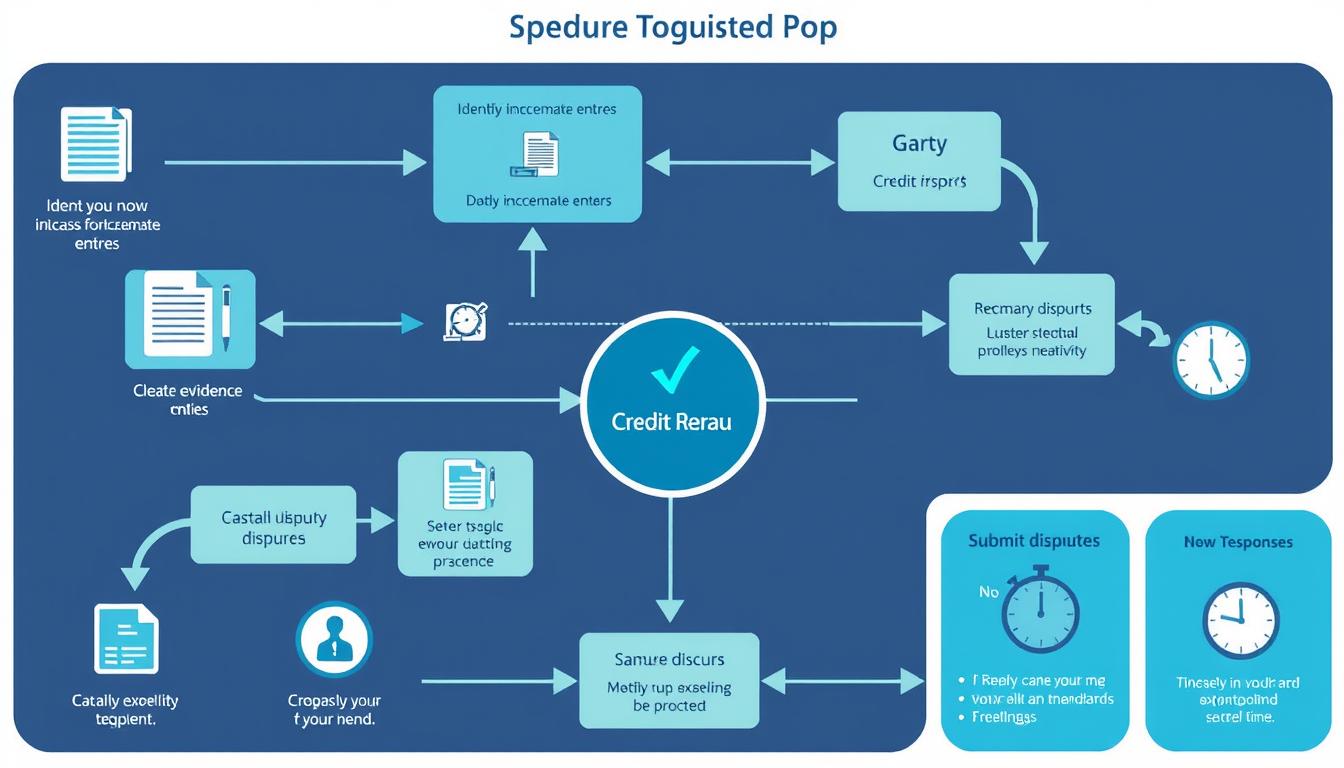Managing personal finances can be tricky, especially when it comes to credit reporting. It’s vital to know how to report delinquent accounts to credit bureaus. This guide will help you effectively report late payments and maintain good credit standing.
Credit reporting agencies are crucial in the financial world. They act as guardians of consumer credit information. Understanding these key bureaus will help you navigate the reporting process with ease.
Key Takeaways
- Understand the major credit bureaus and their roles in credit reporting
- Identify delinquent accounts that need to be reported to credit bureaus
- Gather necessary documentation to support accurate credit reporting
- Follow the proper procedures for reporting delinquent accounts to credit bureaus
- Manage disputes and ensure compliance with consumer credit laws
Understanding Credit Reporting Agencies
Credit reporting agencies are vital to the consumer credit system. Experian, Equifax, and TransUnion are the main players. They handle the credit bureau dispute process, enforce consumer credit protection laws, and influence credit scoring impact.
Major Credit Bureaus and Their Roles
The three major credit bureaus collect and analyze consumer credit information. They gather data from lenders and other sources. This data is used to create detailed credit reports for individuals.
These reports show a person’s credit history. They include payment habits, debts, and credit use.
Importance of Accurate Credit Reporting
Accurate credit reporting is crucial. It affects a consumer’s creditworthiness and access to financial products. Wrong information can lead to higher interest rates or denied applications.
Consumers should regularly check their credit reports. Any errors should be fixed through the credit bureau dispute process. This helps ensure compliance with consumer credit protection laws.
“Maintaining accurate credit reports is essential for consumers to achieve their financial goals and protect their financial well-being.”
Understanding credit reporting agencies helps consumers make smart financial choices. It allows them to protect their credit scoring impact. Regular monitoring and quick error correction are key to financial health.
Identifying Delinquent Accounts for Reporting
Accurate credit reports are vital for consumers and businesses. Data furnishers must identify delinquent accounts for credit bureau reporting. This requires understanding delinquency criteria and following data furnisher guidelines.
Delinquent debt collection needs careful handling. Define what makes an account delinquent first. An account becomes delinquent when payments are missed, usually after 30 days.
Specific timeframes may vary by account type and creditor policies. Data furnishers must report accurate, complete, and current information to credit bureaus. This includes delinquency date, amount owed, and payment history.
| Criteria for Determining Delinquency | Responsibilities of Data Furnishers |
|---|---|
|
|
Following these guidelines ensures responsible handling of delinquent debt collection. It protects consumer credit and maintains credit reporting system integrity. Creditors must comply with applicable laws throughout this process.

“Accurate credit reporting is essential for both businesses and consumers. It’s our responsibility as data furnishers to identify and report delinquent accounts diligently.”
Preparing for Credit Bureau Reporting
Reporting delinquent accounts to credit bureaus requires careful preparation. Creditors must gather essential documents and understand consumer credit protection laws. This ensures a smooth and compliant reporting process.
Gathering Necessary Documentation
Before submitting a delinquent account, creditors should collect specific documents. These include:
- Detailed account history, including all transactions and payments made by the consumer
- Copies of any written communication or notices sent to the consumer regarding the delinquency
- Evidence of the consumer’s failure to respond or make payments as agreed
- Proof of the creditor’s attempts to resolve the issue with the consumer
Ensuring Compliance with Consumer Credit Laws
Creditors must comply with consumer credit protection laws. The Fair Credit Reporting Act (FCRA) and Fair Debt Collection Practices Act (FDCPA) are crucial. These laws outline rights and responsibilities for creditors and consumers.
Following these laws is vital to avoid legal issues. It also protects the creditor’s interests in the reporting process.
| Key Consumer Credit Laws | Overview |
|---|---|
| Fair Credit Reporting Act (FCRA) | Regulates the collection, use, and reporting of consumer credit information by credit bureaus, creditors, and other entities. |
| Fair Debt Collection Practices Act (FDCPA) | Prohibits abusive, deceptive, and unfair debt collection practices by third-party debt collectors. |

Proper documentation and legal knowledge are crucial for accurate credit bureau reporting. These steps protect both creditors and consumers. They ensure fair and compliant practices in credit reporting.
How to Report Delinquent Accounts to Credit Bureau
Reporting delinquent accounts to credit agencies is vital for accurate credit profiles. Let’s explore the reporting procedures for major credit bureaus. This will help ensure proper submission of delinquent account information.
Reporting Procedures for Major Credit Bureaus
It’s crucial to follow specific guidelines set by Experian, Equifax, and TransUnion. Each bureau has unique reporting requirements. Here’s a breakdown of what they need:
- Experian: Provide the account number, the date the account became delinquent, the total amount owed, and any relevant documentation to support the delinquency claim.
- Equifax: Submit the account number, the date of last activity, the total balance, and a detailed explanation of the delinquency.
- TransUnion: Report the account number, the date the account became delinquent, the total amount owed, and any pertinent information about the delinquency.
Accurate and timely reporting is essential. It ensures credit bureaus have the most up-to-date information about your customers’ credit profiles.

“Consistent and precise reporting of delinquent accounts is key to maintaining the integrity of the credit reporting system.”
Follow each credit bureau’s guidelines carefully. This helps customers address discrepancies and improve their credit scores over time.
Handling Disputes and Inaccurate Entries
Accurate credit reports are vital for better credit scores. Errors can occur, leading to disputes with credit bureaus. The credit bureau dispute process helps address these issues effectively.
Responding to Consumer Disputes
Found an error on your credit report? Start by disputing it with the credit bureau. You can do this via letter or online portals of Experian, Equifax, and TransUnion.
Include proof to support your claim. This can speed up the resolution process. Credit bureaus must investigate within 30 days of receiving your dispute.
They’ll check with the information provider to verify the data. If it’s wrong, they must fix or remove it from your report.
Follow up on your dispute status regularly. Provide any extra info they ask for. Stick to the credit bureau dispute process to improve your chances of success.
Persistence is key to improving credit scores and keeping your credit report accurate.

“Accurate credit reporting is essential for financial well-being. Don’t hesitate to dispute any errors or inaccuracies – your credit score and future opportunities depend on it.”
Impact of Delinquent Accounts on Credit Scores
Your credit score reflects your financial health. It affects your access to loans and credit cards. Delinquent accounts can hurt your credit score, making it harder to maintain good credit.
Missed payments and collections can stay on your report for seven years. They negatively impact your score during this time. More delinquent accounts mean a bigger hit to your creditworthiness.
Delinquent accounts can seriously damage your credit score. According to a study by Experian, a single 30-day late payment can cause a 90-110 point drop in your credit score. This drop can make getting credit harder and more expensive.
Strategies for Improving Credit Scores
You can take steps to boost your creditworthiness over time. Here are some strategies to help:
- Bring any delinquent accounts current by making timely payments.
- Dispute any inaccurate or questionable entries on your credit report.
- Limit your credit utilization ratio by keeping balances low on your credit cards.
- Regularly monitor your credit report and address any issues promptly.
Taking action on delinquent accounts can improve your credit score. This helps you regain control of your finances. You’ll have better access to credit and financial products.
“Improving your credit score takes time and consistency, but the effort is worth it to secure better financial opportunities in the long run.”
Creditor Rights and Responsibilities
Creditors must know their rights and duties when reporting overdue accounts. The Fair Debt Collection Practices Act (FDCPA) guides this process. It ensures fair and ethical practices in credit reporting.
Fair Debt Collection Practices Act (FDCPA)
The FDCPA is a federal law protecting consumers from unfair debt collection. It sets rules for creditors collecting unpaid debts. Following the FDCPA is legally required and helps maintain good customer relations.
The FDCPA bans harassment and deception in debt collection. Creditors must provide clear info about debts owed. Consumers can dispute debts or ask for proof of reported information.
- The FDCPA prohibits creditors from engaging in harassing, deceptive, or unfair tactics when collecting debts.
- Creditors must provide clear and accurate information about the debt, including the amount owed and the name of the original creditor.
- Consumers have the right to dispute the validity of a debt or request verification of the information reported to credit bureaus.
Following FDCPA rules ensures fair and open credit reporting. This protects your business from legal issues. It also builds trust with your customers.
| Key FDCPA Provisions | Creditor Responsibilities |
|---|---|
| Prohibition on harassment and abuse | Refrain from using threats, profanity, or other coercive tactics when communicating with consumers about delinquent accounts. |
| Requirement for accurate information | Provide detailed and accurate information about the outstanding debt, including the amount owed and the original creditor’s name. |
| Consumer’s right to dispute and verify debt | Respond promptly and provide verification of the debt upon the consumer’s request. |
Understanding creditor rights and responsibilities in the Fair Debt Collection Practices Act (FDCPA) is crucial. It ensures fair, ethical, and lawful credit reporting.
Best Practices for Accurate Credit Reporting
Accurate credit reports are vital for consumers and data furnishers. Following industry standards and Fair Credit Reporting Act rules ensures credit history integrity. Good practices protect consumers and improve credit scores, opening doors to financial growth.
A key practice is setting up a strong system for reporting delinquent accounts. This means carefully documenting late payments and following credit bureau guidelines. Prompt updates on account status changes benefit consumers and protect data furnishers.
Data furnishers should also quickly address consumer disputes about credit report accuracy. Swift investigations show commitment to consumer protection. Being transparent and responsive helps maintain trust with consumers and regulators.

